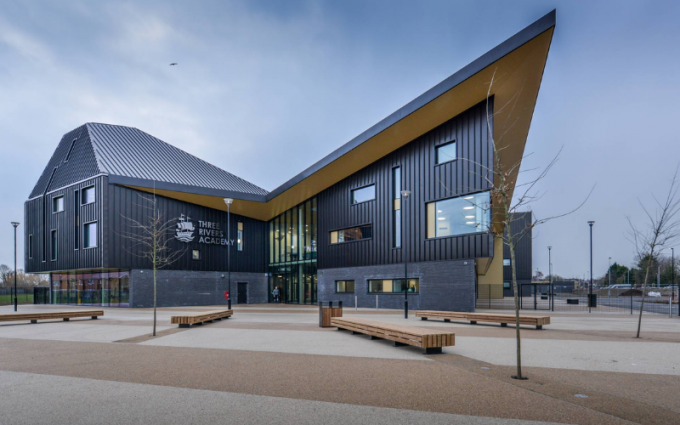The Need
The River Tyne Academy is an alternative provision setting based in Gateshead. It has 97 children on the roll, many of whom have either been permanently excluded from mainstream education or are ‘hard to place’ in other schools. Many of the Academy’s pupils are in the care of the local authority with 60 per cent in receipt of free school meals and around 25 per cent with Special Educational Needs. Pupils also have a lower than average level of literacy, which can be a barrier to their learning. The school is situated in the middle of a housing estate which has high levels of crime and poverty but in an area that also includes pockets of affluence. At its last Ofsted inspection in 2016, the setting was found to be Inadequate. At the time, pupils’ behaviour was poor with a high number of physical interventions used to keep pupils and staff safe. Teachers were struggling to manage the behaviour they were faced with and the school was focused on containing problems rather than helping pupils to learn. The academy was sponsored by River Tees Multi-Academy Trust, a successful Trust based in Middlesbrough, and the improvement journey really began. Then, in 2017, the then deputy headteacher Adele Brown (pictured above) heard about how a Pupil Referral Unit in Northumberland had successfully used the Thrive Approach® to respond to the behaviour problems of their pupils. Following a successful presentation about the impact of Thrive, the Trust funded Mrs Brown to train as a Licensed Practitioner herself and the school began its Thrive® journey.
The Result
Having profiled all pupils using the Thrive-Online™ (TOL) assessment tool, Mrs Brown realised that many of them had gaps in their social and emotional development and she started working on a one-to-one basis with the pupils in most need to use the action plans generated by TOL as a way of ‘filling in’ these developmental gaps. She found that using Thrive’s Vital Relational Functions, a simple change in how adults relate to the children in their care, made a huge difference to how pupils at the Academy responded.
"Everything changed at that point. I started to understand what the children were trying to communicate. It was like being a magician - the change was amazing. I had these skills and I had a different approach. I realised that I needed to get Thrive embedded as a whole school practice so that everyone could benefit."
It was obvious to her colleagues that Mrs Brown’s new approach was successful and she was soon being asked to do a lot of behaviour observations and to work with an increasing number of children, as well as continuing in her main role as deputy headteacher. It rapidly became apparent that this was too much to fall to one person and the school decided that, in order to continue with the results they were seeing, as many staff as possible should be trained as Thrive Licensed Practitioners®.
"It was a great time to bring Thrive in because staff wanted to get these skills. They wanted to know more because they could see that it was a game-changer and that when children felt validated and listened to, they responded in a completely different way."
Inevitably, this led to a discussion around budget and how training a large proportion of staff in the same financial year could be managed in a cost-effective way. The answer, for the River Tyne Academy, was for Mrs Brown to complete Thrive’s Train the Trainer course which allowed her to train the school’s staff, and those from other schools in its Multi Academy Trust, using River Tyne Academy to host the course. This meant that not only could staff at the school take part in Licensed Practitioner training at a heavily-discounted rate but that the school earned income from being used as a training venue. This income stream is likely to continue as nearby community organisations have also requested Thrive training which will be delivered by Mrs Brown and held at the River Tyne Academy.
The Train the Trainer course also brought significant personal and professional benefits to Mrs Brown, who had been appointed headteacher in the meantime.
“When I was doing my Licensed Practitioner training, I realised what Thrive could do for a child. Doing the Train-the-Trainer course, I realised what Thrive could do for me as an individual. I became much more self-aware during that process. I felt like during those 10 days I went on a personal journey. It’s made me a better person and a better parent - I was a good parent before but the Thrive training has made me a much more self-aware parent,” she said.
For pupils with the highest level of need, Thrive has been used as the basis for their curriculum, meaning that they are encouraged to be in a calm, receptive place where they can then engage with learning. The remainder of pupils all have 15 minutes of ‘Thrive time’ at the start of the day as this was when they said they most needed support to help them regulate and adjust to the busy school environment. This has taken the form of a breakfast club where children can sit down with Thrive practitioners and enjoy something to eat and a hot drink while they chat, chill out and get ready to start the school day feeling calm and ready to learn.
Just before lockdown started, six colleagues from River Tyne Academy itself, and a further six from across the Trust, completed their Licensed Practitioner training, bringing the total number of practitioners in the school to seven and 13 across the Trust. As a trainer, Mrs Brown has been able to support her colleagues as they began putting into practice what they learned on the course, something that has helped them to support pupils during the challenges of Covid-19. During this time, Thrive practitioners used the Thrive-Online profiling tool to generate strategies and activities to help pupils to manage their emotions. Mrs Brown has also completed Thrive’s Reconnecting After Lockdown webinar to help prepare for the full reopening of school in September.
“I found it (the webinar) very relevant. All the things in there about viewing this period of time as loss were useful. I do think it will result in an increase of behaviour needs and I’m passionate that the children benefit from a safe and stable return,” she said.
The impact of embedding the Thrive Approach has significantly improved the school. The number of times pupils have had to be physically restrained has gone down from a ‘staggeringly high’ amount to around 10 incidents per term with pupils now to be found in class, rather than out in the corridor, during lessons. Fixed term exclusions have also been dramatically reduced and are now used only as a last resort and attendance rates have increased from 40 per cent to 90 per cent.
"The culture of the school has shifted from managing behaviour to learning. We’re trying to equip children with strategies to help them identify how they are triggered. The children feel that we listen to them which has made a huge difference to the relationship we have with them. The majority of our cohort are now able to think about how they could have done things differently and how they might behave next time."
There have also been changes with the school’s role in the community. Police used to attend the school on a regular basis but now rarely do and relationships with parents and carers have also improved, with Mrs Brown due to start a Family Thrive course soon so that parents can learn how to apply the Thrive Approach at home so that children benefit from a consistent approach at home and at school. Mrs Brown also plans to apply to have River Tyne Academy and its Multi Academy Trust awarded Thrive Ambassador status to recognise the way it has embedded the Approach.
In light of its previous poor Ofsted rating, the school has been working with an improvement consultant ahead of its next Ofsted inspection. This consultant has advised that the school should aim for an Outstanding rating in its next inspection and is highly likely to receive at least a ‘Good’ assessment. During the inspector’s visit, Mrs Brown will present data from Thrive-Online to show the progress pupils have made.
"It evidences that we are developing well-rounded, self-aware young people – that’s what Thrive can do for a school. I’ve previously used TOL to show to our governors and a CAMHS nurse because it sets out very clearly what we are doing and the effect it is having."
Having experienced first-hand the many benefits Thrive can offer, Mrs Brown advised schools that are beginning their Thrive journey to be prepared for change – personally and professionally.
"Thrive is something huge. It’s something you’ve got to invest in, in every sense of the word, but it will take everything you think you know about behaviour and how you are taught to manage it and turn it all on its head. One thing that happened immediately for us was the unsafe behaviour we were seeing from children and the high level of crisis situations decreased dramatically. Other changes have taken longer but I look at it now and can see just how far we have come as a school in a relatively short space of time."
Over to you
Reduced anxiety and behavioural incidents. Calmer classrooms filled with engaged leaners. Improved relationships with parents and carers. These are just some of the outcomes reported by settings embedding Thrive’s whole-school approach to mental health and wellbeing. Are you ready to join them? Click here to get started.
Pass it on
Small actions can lead to a big ripple effect. If you enjoyed this post or found it helpful, please consider supporting us in our mission to help every child and young person feel safe, supported and ready to learn by sharing it using the social media buttons below.
Want to join a like-minded community of senior leaders and classroom staff benefitting from insights and strategies to improve attendance, behaviour and attainment? Add your email address below. (It’s easy to unsubscribe).

_680.jpg)
_680.png)
(1)_680.jpg)

